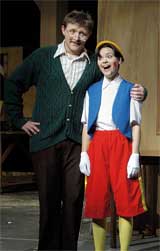Pinocchio production captures child audience

The latest theatre production, Pinocchio, the Puppet was performed to 5,600 people during eight shows.
Wooden boys, lies and a giant whale wowed almost 6,000 children and adults during eight performances.
Missouri Southern’s latest production, Pinocchio, the Puppet was performed before the general public Dec. 4-5 at Taylor Performing Arts Center. Prior to the public performances, the cast performed for busloads of area school children. The play was adapted from the original short story by Duane Hunt, professor emeritus.
“I read several scripts and I just didn’t like them,” Hunt said.
Hunt originally adapted the story when teaching at Southern in 1994, to direct it that same year. He wanted to tell a story that more closely resembled the original. When adapting the story, Hunt included five morals Pinocchio had to learn before he could become a real boy including learning to tell the truth, learning right from wrong and how to tell good people from bad people.
“He couldn’t become a real human being until he learned how to be a good person,” Hunt said. “I think that’s kind of how it is in real life.”
Dr. Lyndall Burrow, assistant technical director, said the sets based on the original story proved to be a problem for the theatre department’s limited budget, but by making each set work twice as hard, the results were creative.
“We tried to simplify,” Burrow said. “We had seven different locations. We had a huge whale, 40 feet long by 16 feet high with bubbles everywhere.”
Burrow said he thinks the cast, composed largely of freshmen who had no experience with children’s theater, did an impressive job, especially considering the busy schedule of performances.
“It demands a lot of energy,” Burrow said. “After you perform for 800 kids, you’re dead and then have to turn around in an hour and a half and perform again. But every time we got a little bit tighter.”
The energy paid off for the cast with an attentive audience which Burrow said made a difference in the children that came.
“It kept their attention,” Burrow said. “The wiggleworm busts out if you lose their attention. They were still, so it means they were either, A, falling asleep, or B, paying attention. I choose to think they were paying attention.”
Your donation will support the student journalists of Missouri Southern State University. Your contribution will allow us to purchase equipment and cover our annual website hosting costs.



























